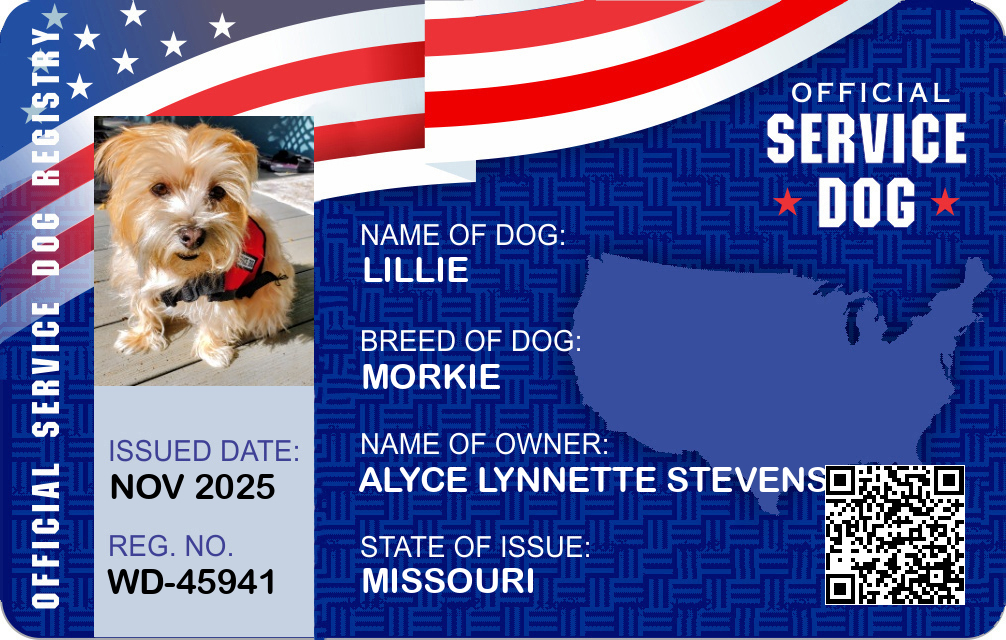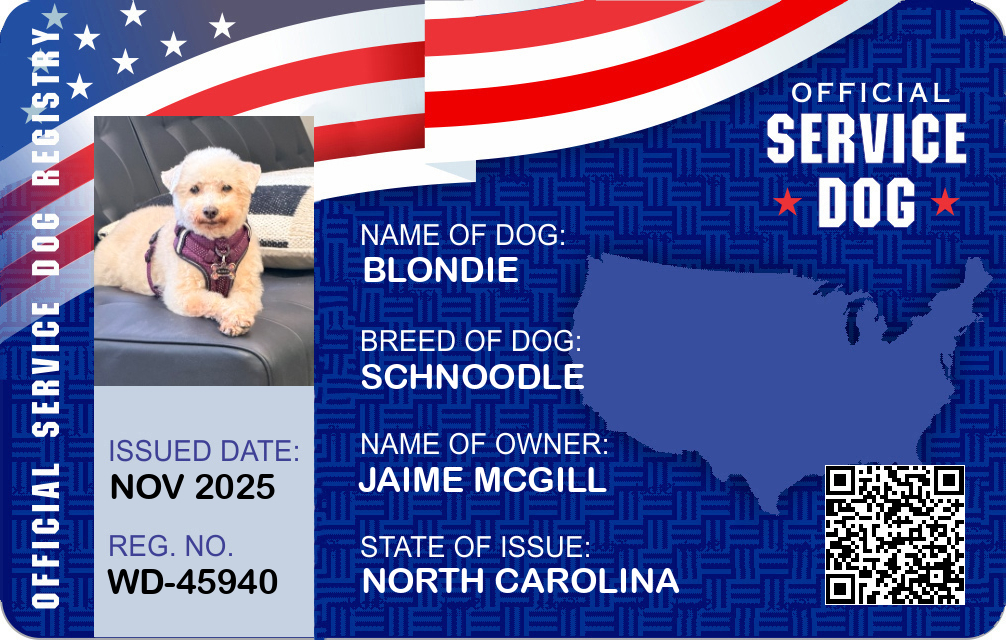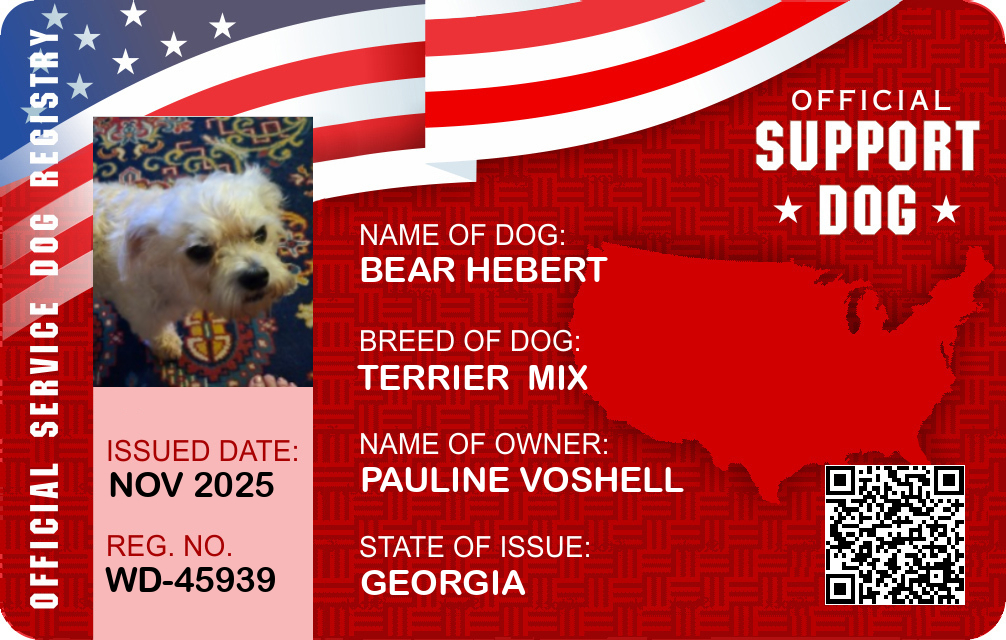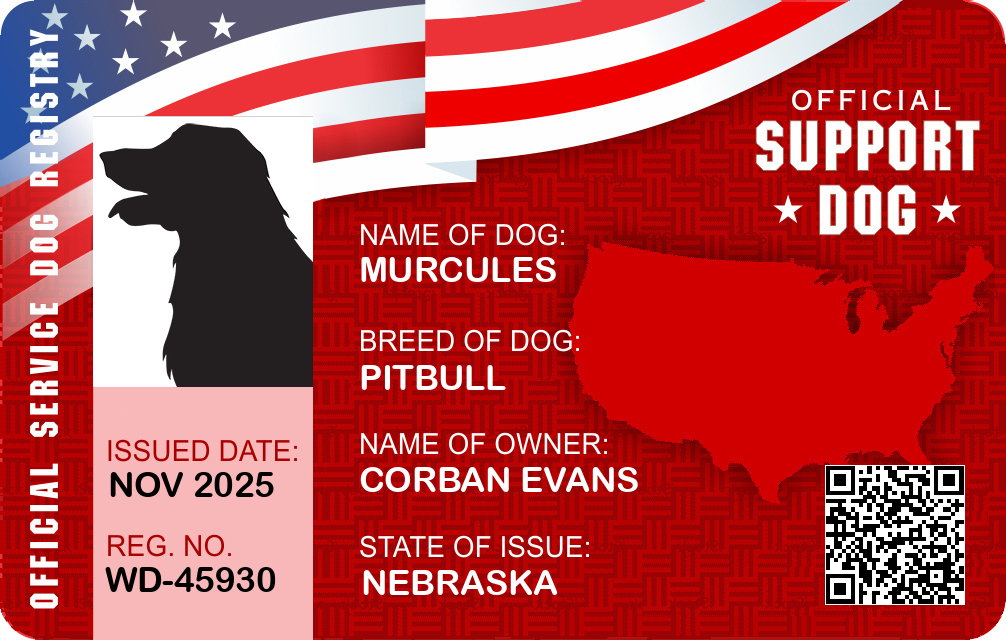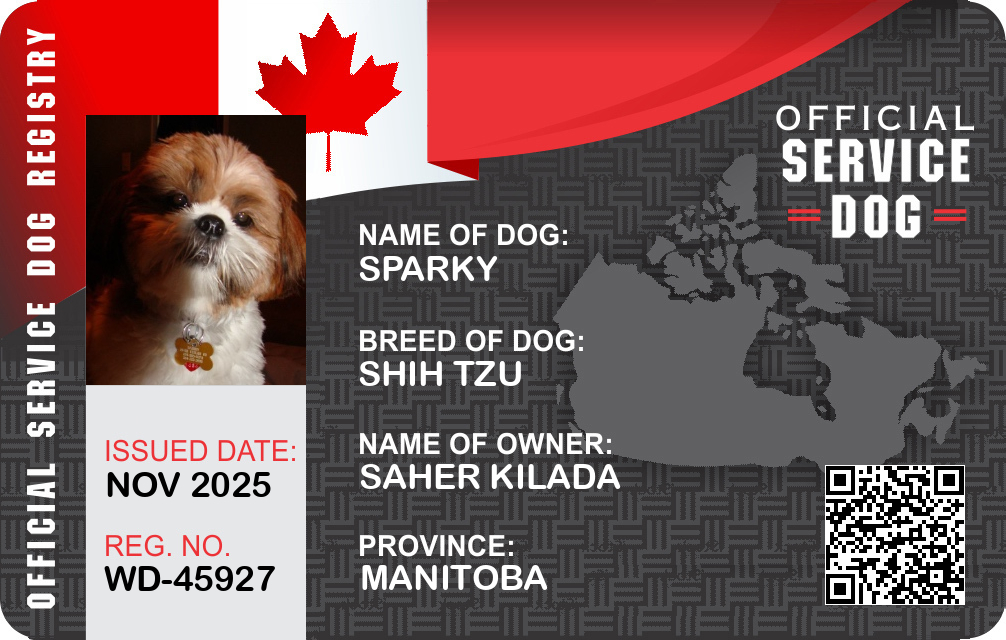Minnesota Service Dog Laws
Register Your Dog

Overview of Service Dog and Legal Definitions in Minnesota
What is a Service Dog?
A service dog is specially trained to perform tasks for a person with a disability that mitigate the disability’s impact on the person’s daily life. These tasks can include guiding individuals who are blind, alerting individuals who are deaf, pulling a wheelchair, alerting and protecting a person who is having a seizure, reminding a person with mental illness to take prescribed medications, calming a person with Post Traumatic Stress Disorder (PTSD) during an anxiety attack, and many more. In Minnesota, as in the rest of the United States, the definition of a service dog is in line with the Americans with Disabilities Act (ADA), which clarifies that these animals are working animals, not pets.
How Service Dogs Differ from Other Types of Assistance Animals
Service dogs differ from other types of assistance animals, such as emotional support animals (ESAs), therapy animals, or companion animals, primarily in their training and the tasks they perform. While ESAs and other animals may provide comfort and support through their presence, service dogs are individually trained to perform specific tasks that assist with a person’s disability. This training requirement places service dogs in a unique category under the ADA, affording them broader access rights compared to non-service animals.
Key Federal Laws Affecting Service Dogs (e.g., ADA, FHA, ACAA)
Three critical federal laws influence the rights of service dog handlers: the Americans with Disabilities Act (ADA), the Fair Housing Act (FHA), and the Air Carrier Access Act (ACAA).
- ADA: Under the ADA, service dogs are permitted to accompany individuals with disabilities in all areas where the public is allowed to go, including restaurants, hotels, and retail stores.
- FHA: The Fair Housing Act ensures that individuals with disabilities can have service dogs in their homes, regardless of a building’s pet policy.
- ACAA: This act requires airlines to permit service dogs to accompany their handlers on flights, provided they do not obstruct other passengers’ spaces or pose safety threats.
Understanding these federal laws is crucial because they provide a baseline of rights that states may expand upon but not restrict.
State-Specific Service Dog Laws in Minnesota
Minnesota service dog laws harmonize with federal laws but include specific provisions to address local requirements and scenarios. These laws reinforce the ADA’s definition and application within the state but may also expand or provide clarity on particular aspects, such as access to certain facilities or entities not explicitly covered under federal law. Minnesota law, for example, mirrors the ADA’s protections by ensuring service dogs have access to all public spaces, further entrenching the ADA’s stipulations within the state’s jurisdiction.
Housing Rights and Responsibilities
In Minnesota, as under the FHA, individuals with service dogs are entitled to reasonable accommodations in housing, even if the property has a no-pet policy. This encompasses rental housing, condos, homeowner associations, and college dormitories. Landlords may not charge pet fees for service dogs, but tenants are responsible for any damage the service animal may cause. Requests for accommodation should be accompanied by documentation that substantiates the need for a service dog, although this may not be required if the disability is apparent and the necessity for the service dog is obvious.
Public Access and Accommodation
Under Minnesota law, service dogs must be allowed to accompany their handlers in all places of public accommodation. This includes restaurants, hotels, public transportation, museums, and more. Businesses may not demand proof of certification, licensing, or training documentation as a condition of entry. Staff may only inquire whether the dog is required due to a disability and what tasks the dog has been trained to perform, if these are not immediately obvious.
Transportation and Travel Rules
In accordance with the ADA and state legislation, Minnesota’s public transportation, including buses, trains, and ride-shares, must accommodate service dogs. Additionally, the ACAA ensures that service dogs are allowed to accompany handlers on flights that operate from Minnesota airports. Airlines may require documentation related to health, training, or behavior but cannot impose charges for accommodating service dogs.
Employment and Workplace Considerations
Employers in Minnesota must comply with the ADA’s regulations concerning service dogs in the workplace. Employees may request reasonable accommodations for their service dog as necessary due to their disability. Employers are encouraged to engage in an interactive process with the employee to asc
ertain suitable accommodations, ensuring that the dog can accompany the handler provided it does not cause undue hardship to the business operation.Documentation, Requirements, and Processes in Minnesota
Service Dog Documentation and Who Can Issue It
While federal and state laws do not mandate formal certification or identification for service dogs, handlers may choose to carry documentation to demonstrate their dog’s role and training, especially when disabilities are not overt. Documentation might include letters from healthcare providers verifying the handler’s need for the service dog. These documents can be issued by licensed professionals familiar with the handler’s disability and the role the service dog plays.
Landlord, Business, and Provider Verification Rules
Minnesota enforces that landlords, business owners, and service providers cannot demand documentation from handlers beyond the permissible questions under the ADA. However, in cases where the necessity of the service dog is not evident, they may request a letter from a healthcare professional. Verification procedures should not be invasive or burdensome and must respect the privacy and dignity of the individual with a disability.
Rights, Limitations, and Legal Risks
Rights Service Dog Handlers Have in Minnesota
Service dog handlers in Minnesota enjoy substantial rights, including access to public facilities, housing rights regardless of pet policies, and unconditional access to public transportation systems. These rights ensure full participation in public life, aligning with the ADA’s objectives of eliminating barriers and fostering inclusivity for individuals with disabilities.
Limits on Service Dog Protections and Common Restrictions
Despite broad rights, service dog handlers in Minnesota face certain limitations. For instance, service dogs may be excluded or removed if they are out of control, not housebroken, or pose a direct threat to the health or safety of others. Furthermore, places of worship may apply their own policies regarding the presence of service animals.
Penalties for Fraud or Misrepresentation
Minnesota enacts strict policies against fraudulent representation of pets as service dogs. Falsely claiming an animal as a service dog to gain access to certain spaces or avoid pet fees may result in legal penalties, including fines. These penalties are in place to protect the credibility of true service animals and handlers and ensure that resources and accommodations are reserved for individuals with legitimate needs.
Practical Guidance for Service Dog Handlers in Minnesota
How to Qualify for a Service Dog Legitimately
To qualify for a service dog in Minnesota, individuals need to have a disability and a requirement for a dog to perform tasks that mitigate the disability. Candidates should seek services from reputable training organizations and may need to provide documentation from a healthcare provider to verify their disability and need for a service dog.
How to Talk to Landlords, Airlines, and Employers
When discussing service dog accommodations with landlords, airlines, or employers, clarity and preparedness are crucial. Handlers should clearly explain their rights under the ADA and state law and provide pertinent documentation, if necessary. Open communication about how the service dog assists them and addresses any concerns can foster understanding and collaboration between parties.
Summary of Service Dog Laws in Minnesota
The following is a summary of key rights, limitations, and practical tips for service dog handlers in Minnesota:
- Rights:
- Access to public places, transportation systems, and housing without extra fees
- Accommodations in the workplace when required
- Limitations:
- Service dogs must be under control and not disruptive
- Legal limits exist on locations that must admit service dogs
- Documentation:
- While not required, having documentation can ease access and clarify the dog’s role
- Fraud Penalties:
- Misrepresenting a pet as a service dog is punishable by fines
- Practical Tips:
- Understand and exercise your rights confidently
- Prepare documents and engage in open discussions with landlords, employers, and other stakeholders
Understanding and adhering to both federal and Minnesota-specific legal frameworks ensures that service dog handlers are well-equipped to navigate their rights and responsibilities effectively, promoting a more inclusive and supportive environment for individuals with disabilities.



